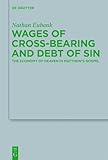Wages of Cross-Bearing and Debt of Sin : The Economy of Heaven in Matthew’s Gospel / Nathan Eubank.
Material type: TextSeries: Beihefte zur Zeitschrift für die neutestamentliche Wissenschaft ; 196Publisher: Berlin ; Boston : De Gruyter, [2013]Copyright date: ©2013Description: 1 online resource (235 p.)Content type:
TextSeries: Beihefte zur Zeitschrift für die neutestamentliche Wissenschaft ; 196Publisher: Berlin ; Boston : De Gruyter, [2013]Copyright date: ©2013Description: 1 online resource (235 p.)Content type: - 9783110303841
- 9783110304077
- online - DeGruyter
- Issued also in print.
| Item type | Current library | Call number | URL | Status | Notes | Barcode | |
|---|---|---|---|---|---|---|---|
 eBook
eBook
|
Biblioteca "Angelicum" Pont. Univ. S.Tommaso d'Aquino Nuvola online | online - DeGruyter (Browse shelf(Opens below)) | Online access | Not for loan (Accesso limitato) | Accesso per gli utenti autorizzati / Access for authorized users | (dgr)9783110304077 |
Frontmatter -- Acknowledgements -- Contents -- Introduction -- 1 Heavenly Treasure and Debts in Early Judaism and Christianity -- 2 Heavenly Treasures and Debts in Matthew -- 3 Filling Up All Righteousness: Salvation from the Debt of Sin -- 4 Wages of Cross-Bearing: Eternal Life, Glorious Thrones, and the Ransom-Price for Captive Debtors -- 5 “Behold, Your Savior Comes, His Wage is with Him”: The Passion and Resurrection -- Conclusion -- Bibliography -- Index of Modern Authors -- Index of Ancient Sources
restricted access online access with authorization star
http://purl.org/coar/access_right/c_16ec
In comparison to Mark and Luke, the First Gospel contains a striking preponderance of economic language in passages dealing with sin, righteousness, and divine recompense. For instance, sin is described as a debt, and righteous deeds are said to earn wages with God or treasure in heaven. This study analyzes Matthew’s economic language against the backdrop of other early Jewish and Christian literature and examines its import for the narrative as a whole. Careful attention to this neglected aspect of Matthew’s theology demonstrates that some of the Gospel’s central claims about atonement, Jesus’ death and resurrection, and divine recompense emerge from this conceptual matrix. By tracing the narrative development of the economic motif, the author explains how Jesus saves his people from their sins and comes to be enthroned as Son of Man, sheds new light on numerous exegetical puzzles, and clarifies the relationship of ethical rigorism and divine generosity.
Issued also in print.
Mode of access: Internet via World Wide Web.
In English.
Description based on online resource; title from PDF title page (publisher's Web site, viewed 28. Feb 2023)


